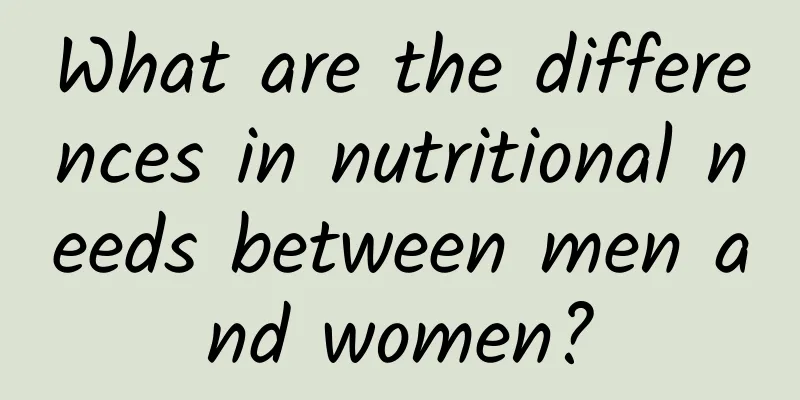What are the differences in nutritional needs between men and women?

|
There’s a saying that goes, “Men are from Mars, women are from Venus.” Men and women seem to have different temperaments, interests, conversation rhythms, and food preferences. But are there also differences in nutritional needs between men and women? Some people may say: Men and women are both human beings, so how big of a difference can there be in their nutritional needs? It is true that although men and women are the same species, their nutritional needs should be similar. However, due to differences in physiological structure and social activities, there are certain differences in nutritional needs between men and women. Taking the mineral "iron" as an example, iron deficiency anemia is almost a "disease exclusive to women" and rarely occurs in men. If men blindly supplement iron and cause excessive iron intake, it will also cause harm to their health and even increase the risk of cancer. So, today let's talk about the nutritional differences between men and women. Men should take more: B vitamins, zinc, choline, vitamin A. β-carotene Vitamin B1, B2 and niacin: The recommended intake of vitamin B1 and B2 for men is 1.4mg, while the recommended intake of these two nutrients for women is 1.2mg. Niacin is also called vitamin B3. The recommended intake of niacin for adult men is 15mg, while for women it is only 12mg. These vitamins are closely related to energy metabolism and mental stress. Men's energy metabolism is often higher than that of women. At the same time, many men are not good at dealing with stress, so mental stress will be greater. In addition to vitamins B1 and B2, there are also vitamins B6 and B12 in the B vitamins, each of which performs its own duties and works together. It is recommended to pay attention to the supplementation of B vitamins. Supplementation suggestion: B vitamins are all water-soluble, and the excess will be excreted from the body instead of being stored in the body, so they need to be supplemented every day. B vitamins are mainly found in whole grains, vegetables, pork, milk and other foods. Zinc. The trace element zinc is an essential element for the human body. It is closely related to metabolism, growth and development, and many other physiological functions. In particular, it plays an important role in maintaining the complete structure and function of the male reproductive system. For men, zinc is even more important. Male semen contains a large amount of zinc. Insufficient zinc in the body will affect the quantity and quality of sperm. If a man's sense of taste decreases, and the area around his nose becomes greasy, red, and prone to peeling, it is likely that he is zinc deficient. The "Dietary Nutrient Reference Intake for Chinese Residents" points out that adult women need to consume 7.5 mg of zinc per day, while men need 12.5 mg. Supplementary suggestions: Seafood, such as shellfish, shrimp, crab, fish, etc. are rich in zinc; animal liver, pork liver, chicken liver, duck liver, etc.; nuts, such as sesame, pine nuts, sunflower seeds, etc. also contain a certain amount of zinc. Choline. Choline is also an important vitamin. Choline deficiency can lead to abnormal liver function, fatty degeneration of the liver, and accumulation of triglycerides that fill the entire liver cells. Choline deficiency can also lead to impaired cognitive function in the elderly. For pregnant women, choline deficiency can also affect neurodevelopment and cause neural tube defects in the fetus. The recommended daily intake of choline for men is 500 mg, while for women it is 400 mg. The intake of methionine, folic acid and vitamin B12 in the diet, energy intake and consumption, and dietary protein intake will affect the body's need for choline. Women can use choline more effectively, so men need more choline than women. Supplementary suggestions: Choline exists in food mainly in the form of lecithin in the cell membranes of various foods. It is rich in liver, meat, eggs, peanuts, soy products and milk. Vitamin A. Vitamin A is a very important fat-soluble vitamin. If vitamin A is deficient, the skin will become rough, the immunity will be affected, and it will be easy to catch a cold. It will also affect the dark adaptation ability of the eyes, that is, the eyes will not be able to see clearly in dark places. It will also affect the development of teeth and bones. The recommended intake of vitamin A is 800 ugRAE for men and 700 ugRAE for women. The reason for the difference in the recommended amount of vitamin A is mainly related to weight. Supplementary suggestions: The direct active source of vitamin A is animal liver, such as chicken liver, pork liver, etc. Sufficient intake of beta-carotene can also be converted into vitamin A in the body. Foods rich in beta-carotene are dark green fruits and vegetables and orange-yellow fruits and vegetables, such as spinach, kale, pumpkin, mango, carrot, etc. Women should supplement more: calcium and iron Calcium: The importance of calcium supplementation is beyond words. Calcium is essential for the health of bones and teeth. To ensure health, adults should take at least 800 mg of calcium per day, while pregnant women, nursing mothers, and women over 50 should take 1,000 mg of calcium per day. Supplementary suggestions: Dairy products, such as milk, yogurt, cheese, etc.; soy products, such as tofu, dried bean curd, yuba, etc.; green leafy vegetables, such as kale, rapeseed, amaranth, and Chinese cabbage, are rich in calcium. In addition, vitamin D can promote calcium absorption, and vitamin K can assist calcium in bone formation. It is also necessary to supplement them at the same time when supplementing calcium. Iron: Iron is an important component of hemoglobin. Women of childbearing age lose some iron every month due to menstruation. For them, iron supplementation is equivalent to blood supplementation. In addition, iron is also closely related to growth and development and immunity. However, iron cannot be supplemented blindly. If iron is excessive, the oxidative free radicals in the body will increase, causing an increased risk of chronic diseases and cancer. Women aged 18 to 50 need about 20 mg of iron supplementation per day on average, while men only need 12 mg. Supplementary tips: Iron is divided into animal heme iron and non-animal non-heme iron. The former is better absorbed. Therefore, it is best to get iron from red meat and animal offal. In addition, vitamin C will promote the absorption of iron, so while supplementing iron, you should also eat more vegetables and fruits. |
<<: Does the subway run on electricity or oil? Why can't the subway operate 24 hours a day?
Recommend
Lower abdominal pain with brown vaginal discharge
In life, many women suffer from gynecological dis...
Several ways for girls to lose weight healthily
Everyone loves beauty. Girls never stop pursuing ...
Kakao's game revenue forecast shows the future growth of WeChat games
Let's first look at the latest data of Kakao ...
Share fluoride and protect your teeth until old age
Author: Du Jinying, Guo Ruiyi, Li Ruidi School: P...
What to do if the milk is swollen after induced labor at four months
Generally, after pregnancy, a large amount of est...
How to be careful about miscarriage and abdominal pain after pregnancy?
During pregnancy, pregnant women, in addition to ...
What are the treatments for recurrent fungal vaginitis?
Nowadays, many people often encounter fungal vagi...
What is konjac made of? Is konjac a food that causes allergies?
Konjac is a food with high nutritional value, con...
Precautions and taboos for confinement
There are many things to pay attention to during ...
What is the cause of small particles in the cervix?
The condition of the cervix is closely related ...
Can fallopian tube adhesions be cured?
Some women suffer from fallopian tube diseases, w...
Daily necessities needed for induced labor
With the development of society and the developme...
What are the Chinese medicines for regulating menstruation?
Many women have experienced symptoms of excessive...
Nielsen: Current Status of the U.S. Smartphone Market in July 2012
Mobile phone manufacturers have released new mobi...
Is it normal to have itchy episiotomy wound?
Episiotomy during normal delivery is when a woman...


![[Medical Q&A] When children have a fever, which is more reliable, physical cooling or drug cooling?](/upload/images/67eff87ec8793.webp)






